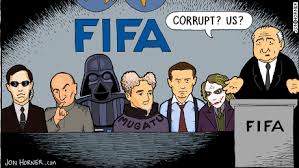Parallel Prosecutions and U.S. Jurisdiction: Looking Beyond the Bribes in the FIFA Scandal
 Lauren Connell from The Volkov Law Group joins us again for a posting about the implications of the FIFA Scandal. Her profile is here and she can be reached at [email protected].
Lauren Connell from The Volkov Law Group joins us again for a posting about the implications of the FIFA Scandal. Her profile is here and she can be reached at [email protected].
Everyone is talking about the latest corruption scandal, this one with world-wide impact. The scandal engulfed FIFA as seven organization officials were recently arrested in Switzerland. Charges include a range of money laundering, racketeering, and conspiracy charges.
For years, a number of international watchdog bodies have criticized FIFA for the combination of huge revenues and a lack of transparency. With the ability to bring millions of dollars in revenues to host cities and partner media companies, it is a perfect recipe for corruption. FIFA’s 24-member executive committee was responsible for deciding on World Cup host countries, an extremely concentrated decision-making body whose power rivaled heads of state on the national financial and commercial stage.
Details of the scheme revealed bribe requests ranging from millions of dollars in cash payments to special favors such as a being knighted in England (who submitted a World Cup bid). Despite these seemingly glamorous bribery requests, the underlying scheme is nothing new – money and favors being traded for influence in decisions that promise to enrich the “winners.”
The investigation was made public along with four guilty pleas that had been held under seal pending the investigation being made public. The testimony of those four key individuals helps to make the case against FIFA and provides detail to the charges.
But if you look deeper than the money for votes bribery scheme, there is a lot to learn and talk about in the prosecution itself.
The investigation is a parallel prosecution, Switzerland has also filed criminal charges and the U.S. and Switzerland have both professed a commitment to sharing information. Not to mention that the U.S. is taking the lead in the first place. FIFA is a huge body that wields an enormous amount of power, the fact that the U.S. is willing to take on prosecution of it’s corruption reinforces the U.S.’ reputation as taking corruption seriously.
Having led the world for decades with our FCPA prosecutions, oftentimes aimed at foreign nationals and companies, this is another example of the U.S. asserting jurisdiction to prosecute corruption elsewhere. Jurisdiction is based on connections to the U.S., including the involvement of U.S. companies, the use of U.S. financial entities and the routing of money through U.S. boundaries.
But the U.S.’ prosecution efforts have recently been joined by other countries enacting or enforcing their own anti-corruption laws. With this rise, parallel prosecutions are becoming increasingly common. Here, Swiss and U.S. criminal investigations focusing on much the same behavior were announced on the same day, coinciding with arrests made by Swiss authorities, in coordination with U.S. prosecutors, in Switzerland.
 Regardless of the outcome of this particular investigation, the U.S. and Switzerland should be lauded for being willing to take on such a powerful organization. More importantly for business interests throughout the world, the rise of the parallel prosecution should be noted. Anti-corruption compliance programs need to make a commitment to compliance with local laws with the same level as to the FCPA. As more and more countries begin to enforce anti-corruption laws, we will see fewer “FCPA Compliance Policies” and more “Global Anti-Corruption Policies.”
Regardless of the outcome of this particular investigation, the U.S. and Switzerland should be lauded for being willing to take on such a powerful organization. More importantly for business interests throughout the world, the rise of the parallel prosecution should be noted. Anti-corruption compliance programs need to make a commitment to compliance with local laws with the same level as to the FCPA. As more and more countries begin to enforce anti-corruption laws, we will see fewer “FCPA Compliance Policies” and more “Global Anti-Corruption Policies.”
In many ways, a global policy is easier to build and enforce. It requires no complex nuances about who is subject to the policy, e.g. limited to those who may fall under U.S. jurisdiction, a relatively complex categorization to make, and can simply push a clear and consistent message: our company does not engage in bribery. End of story.
















Like Bob Dylan said: “Steal a little, go to jail. Steal a lot, they make you a King.”
Public corruption is the single biggest threat to America and will eventually bring us down.
[email protected]